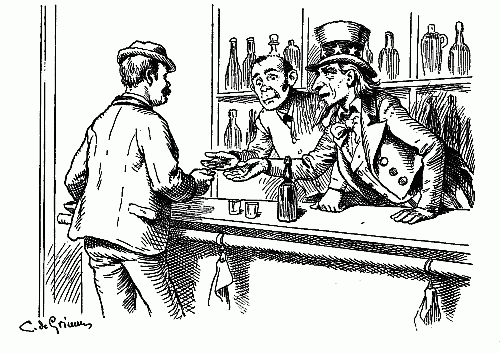This is from a series of pages on sources of federal war spending other than the federal income tax and strategies that war tax resisters can use to reduce their support of the government in these areas.
The Excise Tax on Alcoholic Beverages

Description
All alcoholic beverages sold in the United States, except home-brewed beer and wine or bootlegged liquor, have federal excise taxes applied to their manufacture.
Amount of the Tax
| Product | Tax rate |
|---|---|
| distilled spirits | $13.50 per gallon |
| wine or champagne | $1.07–$3.40 per gallon (depending on type and alcohol content) |
| hard cider | $0.226 per gallon |
| beer | $18 per barrel (a barrel is somewhat under 31 gallons), or, in the case of small brewers (less than two million barrels per year), $7 per barrel for the first 60,000 barrels |
Small wineries (fewer than 250,000 gallons per year) have lower tax rates, with the smallest (fewer than 150,000 gallons per year) at the lowest end of the scale.
In addition, the federal government applies “occupational taxes” to wineries, bottlers, distillers, breweries, wholesalers, retailers, and other premises associated with alcoholic beverages.
How Much the Government Collects
In 2008, the federal government collected $9.5 billion from federal excise taxes on alcoholic beverages.
How This Tax Is Collected
The manufacturer or importer is responsible for paying the tax.
Are the Tax Receipts Earmarked?
These taxes go into the federal government’s general fund.
How Can You Resist This Tax?
Obviously, you can avoid contributing to taxes on alcoholic beverages by not purchasing, manufacturing, selling, or drinking them.
It is also legal under federal law and most state laws to brew your own wine, beer, or cider, so long as you stay under 100 gallons per year (200 gallons if there is more than one adult in your household). You are not required to pay federal excise tax on such home brew that you consume yourself.
You can also bring a small quantity of alcoholic beverages back from a foreign country without being required to pay an import duty.
You can also distill your own spirits at home (moonshine, “bathtub gin”), but this is not legal.
See Also
- How to brew your own beer, a photographic walk-through from The Picket Line
- How to brew your own hard cider, a photographic walk-through from The Picket Line
